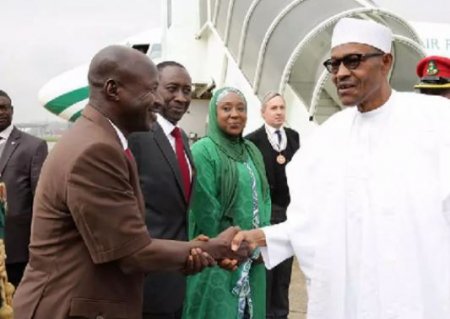P
ProfRem
Guest
Nigeria’s Attorney General and Minister of Justice, Abubakar Malami has alleged that the Economic and Financial Crimes Commission (EFCC) and its Acting Chairman, Ibrahim Magu, are frustrating the Federal Government’s anti-graft war over their stand on the independence of Nigeria Financial Intelligence Unit, NFIU.
Malami, in a statement issued in Abuja, accused EFCC and its Chairman of working to prevent the lifting of the country’s suspension by the global financial intelligence gathering body – Egmont Group of Financial Intelligence Units (Egmont Group), a platform for exchange of expertise and financial intelligence to combat money laundering and terrorist financing.
The platform also and functions as the operational arm of the international anti-money laundering and counter financing of terrorism (AML/CFT) apparatus.
NFIU which was Nigeria’s representative in the group, was suspended on June 1, 2007 over allegations by Egmont Group that it was not independent was subject to the control of the EFCC through Section 1(2)(c) of the EFCC Act.
The group consequently demanded full autonomy for NFIU as a condition for the country’s readmission or else. it would be expelled.

Malami, the chief law officer of the land and Magu have been unable to agree on the form the independence demanded for NFIU by the Egmont Group should take.
While the AGF wants the creation of an autonomous NFIU completely detached from the EFCC, and has sent a Bill to the National Assembly for the purpose, Magu wants NFIU to remain part of EFCC with its operations re-organised.
But in the statement issued Comrade Salihu Othman Isah, his spoeksperson on Wednesday, Malami accused Magu of not cooperating with him in the bid to stop the Egmont Group from carrying out the threat of expelling the country from its fold.
Malami also said the EFCC Chairman has refused to understand the implication of Nigeria’s expulsion from the group on government’s efforts to combat corruption, terrorism, money laundering and other related vices.
Malami therefore commended the Senate for passing the Bill for an independent NFIU and urged the House of Representatives to urgently pass similar Bill currently pending before it.
Malami, in a statement issued in Abuja, accused EFCC and its Chairman of working to prevent the lifting of the country’s suspension by the global financial intelligence gathering body – Egmont Group of Financial Intelligence Units (Egmont Group), a platform for exchange of expertise and financial intelligence to combat money laundering and terrorist financing.
The platform also and functions as the operational arm of the international anti-money laundering and counter financing of terrorism (AML/CFT) apparatus.
NFIU which was Nigeria’s representative in the group, was suspended on June 1, 2007 over allegations by Egmont Group that it was not independent was subject to the control of the EFCC through Section 1(2)(c) of the EFCC Act.
The group consequently demanded full autonomy for NFIU as a condition for the country’s readmission or else. it would be expelled.

Malami, the chief law officer of the land and Magu have been unable to agree on the form the independence demanded for NFIU by the Egmont Group should take.
While the AGF wants the creation of an autonomous NFIU completely detached from the EFCC, and has sent a Bill to the National Assembly for the purpose, Magu wants NFIU to remain part of EFCC with its operations re-organised.
But in the statement issued Comrade Salihu Othman Isah, his spoeksperson on Wednesday, Malami accused Magu of not cooperating with him in the bid to stop the Egmont Group from carrying out the threat of expelling the country from its fold.
Malami also said the EFCC Chairman has refused to understand the implication of Nigeria’s expulsion from the group on government’s efforts to combat corruption, terrorism, money laundering and other related vices.
Malami therefore commended the Senate for passing the Bill for an independent NFIU and urged the House of Representatives to urgently pass similar Bill currently pending before it.

